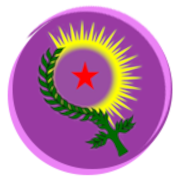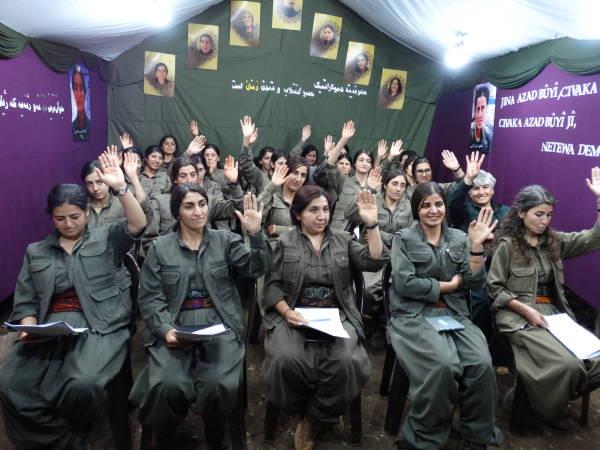Women in Iran and Eastern Kurdistan
Mesopotamia is a land that has been home to a woman-centered social system and free-living people for thousands of years. There is a long tradition in this land. People have created all human values with the mind and hand power of a free society. The discovery of many statues of goddesses in the excavations on the Iranian borders prove that the neolithic revolution was very deep-rooted and long-lasting in these areas.
In short, Iran, which has a very deep-rooted and extensive culture, became a patriarchal cultural structure despite the long phase of resistance. Iranian women today are experiencing a great oppression and lack of knowing their own identity under the violent tendencies of patriarchal culture, although they preserve their mother goddess culture to a certain extent. With the transformation of Islam into a religion of politics and power, the oppression and violence against women has deepened, and life has been transformed into a tortureful one with practices of execution, stoning to death, ‘sijik’ (temporary marriages with imam marriage) and spying. On the one hand, the brutal practices of the Sharia state, and on the other hand, a very strong gendered understanding of society, have led to horrifying levels of female suicide. Since the Iranian state seeks to keep society under control by deepening social degeneration through the decline of women, the state uses all kinds of means and methods that promote dishonor and decline, especially drugs, prostitution and spying.
Kurdish women living in Eastern Kurdistan, on the one hand, live in an unbreathable situation under the regime’s severe oppression of Kurds, and on the other hand, under the strict practices of patriarchal traditions. Women are excluded from all spheres of life, confined to the home and condemned to a life unaware of themselves. In the regions heavily influenced by the state system, women are separated from their social identity, absorbed into the system and degenerated through strong assimilation policies. In Eastern Kurdistan, women are surrounded by social backwardness and special practices of the state and are not allowed to take even a small step outside the given life. Being a woman in a masculine world is difficult, but being a Kurdish woman bears even much more difficult conditions. The fact that Iran does not recognize the Kurds as a distinct identity based on autonomy and does not solve the Kurdish question on a democratic basis, leads to a double oppression and violence against Kurdish women.
Women’s organization in eastern Kurdistan
The Iranian regime does not fulfill even the minimum democratic norms. Therefore, it faces internal opposition, on the one hand, and external pressures, on the other hand. The regime is aware that it is within the scope of intervention by global powers. However, instead of ensuring its own internal democratization and reaching a social consensus on differences and freedoms, it uses repression and violence and tries to dissolve all social dynamics in order to maintain the existence of the system.
The reactionary Iranian Islamic regime sees women and the youth as the main dynamic forces of society and develops a wide range of policies to further internalize these two social segments, which have strong potential and influence. Especially in Kurdistan, the regime is trying to influence and organize many Kurdish girls by focusing on using them for its dirty politics.
Against these dirty politics, the ‘Yekîtiya Jinên Rojhilatê Kurdistan’ (Union of Women of Eastern Kurdistan, YJRK), founded in 2004, has built itself on the basis of responding to and following the legacy of the women’s movements in Eastern Kurdistan and Iran.
The purpose of YJRK is to raise women’s awareness against patriarchal, anti-democratic, theocratic and authoritarian systems and practices that women from Eastern Kurdistan and other peoples living in Iran are exposed to. To lead the organization and the struggle of women. To develop women’s free identity in all areas of life based on women’s liberation ideology by combating male-dominated sexist mentality and structures.
The YJRK was founded by the freedom movement women living in Iran, especially the women of Eastern Kurdistan. While defending the invincibility of a women’s movement based on a deep-rooted ideology of freedom and a philosophy of free life, based on self-power and self-will, it renewed itself as ‘Koma Jinên Azad ên Rojhilatê Kurdistan’ (East Kurdistan Free Women’s Community, KJAR) in 2014 due to the necessities that exist in the revolutionary struggle alongside the changing world and changing conditions in the Middle East.
During the YJRK period, since it believed that women and all oppressed societies and communities should have self-defense forces, it organized itself as the self-defense force of the YJRK in 2010 under the name ‘Hêzên Jinên Rojhilatê Kurdistan (Eastern Kurdistan Women’s Forces, HJRK) within the ‘Hezên Rojhilatê Kurdistan’ (Eastern Kurdistan Forces – HRK).Then, in order to respond more to the developing women’s struggles and attacks, the organization was enlarged and renewed under the name ‘Hêzên Parastina Jin’ (Women’s Defense Forces, HPJ).
The KJAR and HPJ organizations want to protect the social, political, military as well as all vital values of women and to solve the problems of Iranian women, especially women in Eastern Kurdistan, based on a philosophy of freedom.
Ronahî (Shirin Elamhuli), who was executed by the Iranian state in the ‘Evin’ Prison on May 9, 2010, was one of the leading militants of the YJRK. She was murdered because of her fight for democratic national rights and freedom of the Kurdish people. Shirin Elamhuli’s glorious resistance and insistence on freedom has inspired women in Eastern Kurdistan and Iran that the hope of resistance and continuation for a struggle for freedom is necessary. She has also become a symbol of women resisting against the patriarchal system.
Today, dozens of Kurdish women like Zeynep Jalaliyan are imprisoned in Iranian prisons and continue to resist against torture. They fight for the democratization of Iran and for the Kurdish people to achieve a free, fair and equal life, and in particular for the liberation of women. KJAR and HPJ see resisting women like Shirin Elamhuli and Zeynep Jalaliyan as pioneers in their struggle and continue their struggle for their liberation.
The organizational framework of KJAR as a new system can be expressed in 8 basic points:
1- KJAR is the great liberation movement of women in Iran and Eastern Kurdistan.
2- All organizations within KJAR will carry out their work based on basis democratic, social ecological principles and a paradigm of women’s liberation and will be organized based on the principle of self-defense.
3- KJAR believes that the plurality of cultures, identities, nations, religions and beliefs is the richness of society. It conducts struggle by considering the needs of all segments of society, the duty of democratic organizations to liberate people and cultures and religions as the basis and source of the democratic nation. It supports the principle of natural self-defense and democratic participation.
4- Kurdish people struggle for self-governance in Kurdistan, for a democratic system in Iran and for the recognition of the political status of democratic self-governance.
5- KJAR fights against sexism in social structures, racism, patriarchal governments, nationalism and the use of science and religion by the patriarchal mentality. At the same time, they fight against reactionary family structures, which have become a tool in the hands of capitalist modernity and within the rules of patriarchal society, and against this approach’s imposition of ownership primarily on women. It fights for the principle of democratic family and free life based on social sciences and free male-female relations.
6- KJAR establishes a confederal system in all areas in the form of general organizations and communes. It relies on organizations such as public meetings, academies, cooperatives, institutionalizations, etc. and local governments, democratic political activities, organizations and decision-making mechanisms.
7- In all areas where democratic systems and activities are organized, KJAR is based on a co-presidency system and this system is the basis and mechanism of all organizations in society.
8- KJAR defends all values and achievements of women and society. In this context, any act of violence, i.e. any behavior that is not within the scope of self-defense, is unacceptable.

